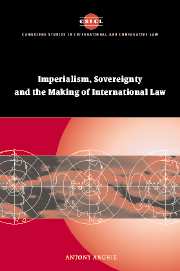Book contents
- Frontmatter
- Contents
- Foreword
- Acknowledgements
- Table of cases
- Table of treaties
- Introduction
- 1 Francisco de Vitoria and the colonial origins of international law
- 2 Finding the peripheries: colonialism in nineteenth-century international law
- 3 Colonialism and the birth of international institutions: the Mandate System of the League of Nations
- 4 Sovereignty and the post-colonial state
- 5 Governance and globalization, civilization and commerce
- 6 On making war on the terrorist: imperialism as self-defence
- Conclusion
- Bibliography
- Index
- CAMBRIDGE STUDIES IN INTERNATIONAL AND COMPARATIVE LAW
Foreword
Published online by Cambridge University Press: 05 August 2012
- Frontmatter
- Contents
- Foreword
- Acknowledgements
- Table of cases
- Table of treaties
- Introduction
- 1 Francisco de Vitoria and the colonial origins of international law
- 2 Finding the peripheries: colonialism in nineteenth-century international law
- 3 Colonialism and the birth of international institutions: the Mandate System of the League of Nations
- 4 Sovereignty and the post-colonial state
- 5 Governance and globalization, civilization and commerce
- 6 On making war on the terrorist: imperialism as self-defence
- Conclusion
- Bibliography
- Index
- CAMBRIDGE STUDIES IN INTERNATIONAL AND COMPARATIVE LAW
Summary
In this challenging book, Dr. Anghie examines a series of episodes in the legal history of the relations between the West and non-Western polities. He argues that they possess common features, reproducing at different epochs and in different ways an underlying pattern of domination and subordination – and doing so despite continued professions of idealism and universal values by the (Western) lawyers and leaders who have been dominantly engaged.
The first of these episodes dates from the earliest phase of international law. Of the five studied, it is the least institutional. Rather it is an episode of justification and apology – Vitoria's attempt to deal with the rights of the Amerindians faced with Spanish colonization. Of course, Vitoria was dealing with this problem after the event and he was teaching (a generation after Columbus) in the Catholic tradition of moral–religious theory and not as a self-perceived international lawyer. But his work, Anghie argues, inaugurated our subject. From the beginning, international law was not exclusively concerned with the relations between states but, and more importantly, with the relations between civilizations and peoples. Moreover these were relations of domination. Colonization and Empire were present at the creation, and the apologetic use of universalist ideals has never been abandoned, whatever new forms it may have taken.
The second episode is that of the 1884–5 Congress of Berlin and the final stages of colonial expansion.
- Type
- Chapter
- Information
- Imperialism, Sovereignty and the Making of International Law , pp. xi - xiiiPublisher: Cambridge University PressPrint publication year: 2005

